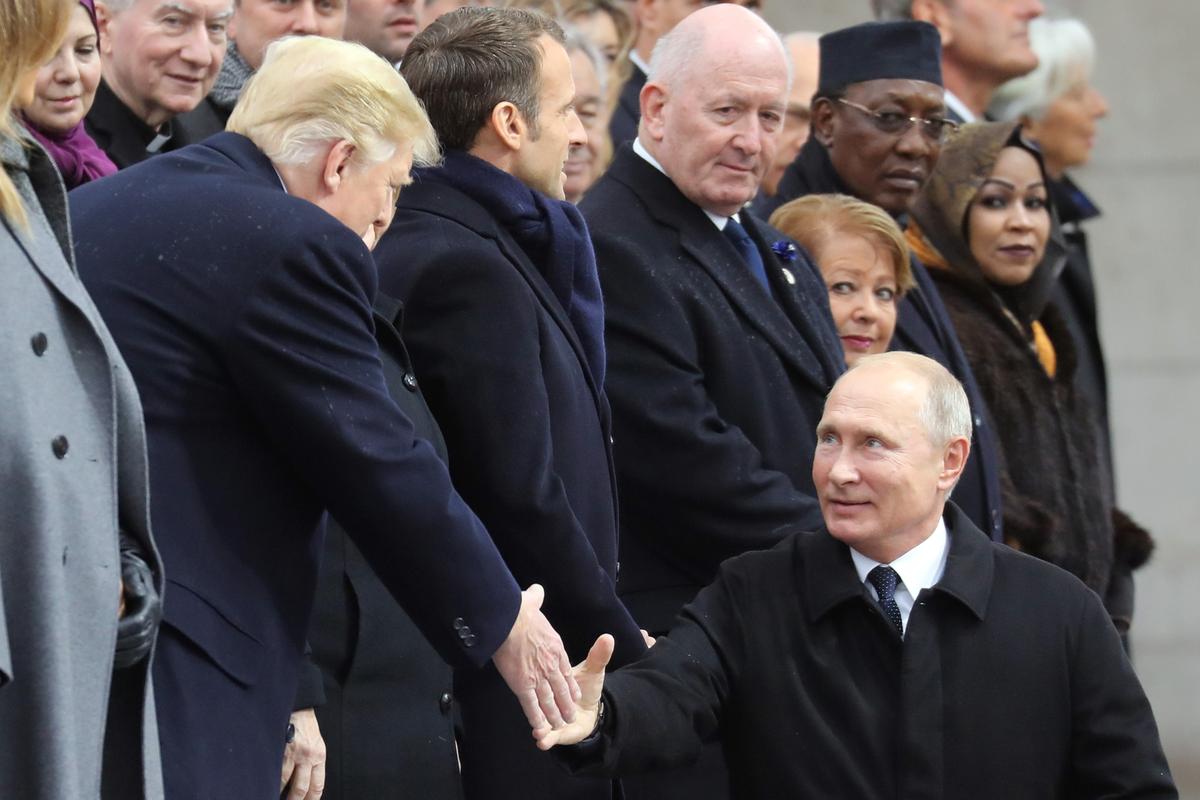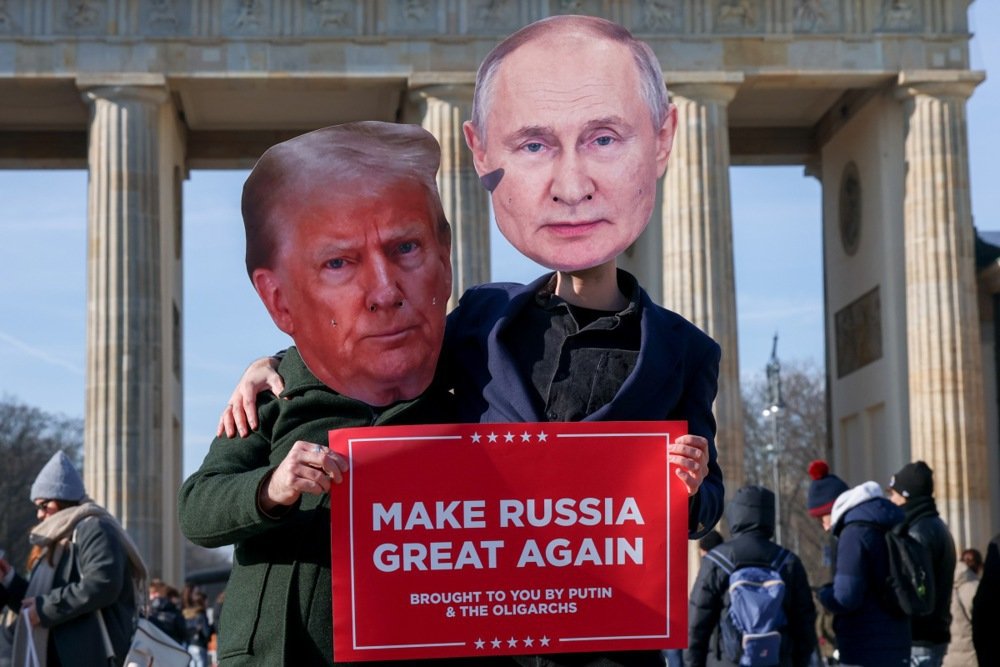



There has been much and justified focus on the implications of a likely deal between US President Donald Trump and his Russian counterpart Vladimir Putin and the overwhelmingly negative consequences this will have for Ukraine and Europe. But if Trump and Putin make a deal, there is much more at stake than Ukraine’s future borders and Europe’s relationship with the US.

Stefan Wolff
Professor of International Security, University of Birmingham
Ukraine’s future is more in doubt than it has ever been since February 2022. For once, analogies to Munich in 1938 are sadly appropriate. This is not because of a mistaken belief that Putin can be appeased, but rather because great powers, once again, make decisions on the fate of weaker states and without them in the room.
Similar to the pressure that Czechoslovakia experienced from both Germany and its supposed allies France and Britain in 1938, Ukraine is now under pressure from Russia on the battlefield and the US both diplomatically and economically. Trump and his team are pushing hard for Ukraine to make territorial concessions to Russia and accept that some 20% of Ukrainian lands under Russia’s illegal occupation are lost. In addition, Trump demands that Ukraine compensate the United States for past military support by handing over half of its mineral and rare earth resources.
There is every indication that Putin is unlikely to stop in or with Ukraine.
The American refusal to provide tangible security guarantees not only for Ukraine but also for allied NATO troops if they were deployed to Ukraine as part of a ceasefire or peace agreement smacks of the Munich analogy. Not only did France and Britain at the time push Czechoslovakia to cede the ethnic German-majority Sudetenland to Nazi Germany, they also did nothing when Poland and Hungary also seized parts of the country. And they failed to respond when Hitler — a mere six months after the Munich agreement — broke up what was left of Czechoslovakia by creating a Slovak puppet state and occupying the remaining Czech lands.
There is every indication that Putin is unlikely to stop in or with Ukraine. And it is worth remembering that World War II started 11 months after Neville Chamberlain thought he had secured “peace in our time”.
The Munich analogy may not carry that far, however. Trump is not trying to appease Putin because he thinks, as Chamberlain and Daladier did in 1938, that he has weaker cards than Putin. What seems to drive Trump is a more simplistic view of the world in which great powers carve out spheres of influence in which they do not interfere.

Vladimir Putin shakes hands with US President Donald Trump at the centenary of the WWI armistice at the Arc de Triomphe in Paris, 11 November 2018. Photo: EPA-EFE/LUDOVIC MARIN/POOL
The problem for Ukraine and Europe in such a world order is that Ukraine is certainly not considered by anyone in Trump’s team as part of an American zone of influence, and Europe is at best a peripheral part of it.
For Trump, this isn’t really about Ukraine or Europe but about reordering the international system in a way that fits his 19th-century view of the world in which the US lives in splendid isolation and virtually unchallenged in the western hemisphere. In this world view, Ukraine is the symbol of what was wrong with the old order. Echoing the isolationism of Henry Cabot, Trump’s view is that the US has involved itself into too many different foreign adventures where none of its vital interests were at stake.
Echoing Putin’s talking points, the war against Ukraine no longer is an unjustified aggression but was, as Trump has now declared, Kyiv’s fault. Ukraine has become the ultimate test that the liberal international order failed to pass.
The pushback from Ukraine and key European countries may seem inconsequential for now, but even without the US, the EU and NATO have strong institutional roots and deep pockets.
The war against Ukraine clearly is a symbol of the failure of the liberal international order, but hardly its sole cause. In the hands of Trump and Putin it has become the tool to deal it a final blow. But while the US and Russia, in their current political configurations, may have found it easy to bury the existing order, they will find it much harder to create a new one.
The pushback from Ukraine and key European countries may seem inconsequential for now, but even without the US, the EU and NATO have strong institutional roots and deep pockets. For all the justified criticism of the mostly aspirational responses from Europe so far, the continent is built on politically and economically far stronger foundations than Russia and the overwhelming majority of its people have no desire to emulate the living conditions in Putin’s want-to-be empire.

Activists rally against the policies of Trump and Putin in Berlin, 20 February 2025. Photo: EPA-EFE/Munich against Hate
Nor will Trump and Putin be able to rule the world without China. A deal between them may be Trump’s idea of driving a wedge between Moscow and Beijing, but this is unlikely to work given Russia’s dependence on China and China’s rivalry with the US.
If Trump makes a deal with Xi Jinping as well, for example over Chinese territorial claims in the South China Sea, let alone over Taiwan, all he would achieve is further retrenchment of the US to the western hemisphere. This would leave Putin and Xi to pursue their own, existing deal of a no-limits partnership unimpeded by an American-led counter-weight.
From the perspective of what remains of the liberal international order and its proponents, a Putin-Xi deal, too, has an eerie parallel in history — the short-lived Hitler-Stalin pact of 1939. Only this time, there is little to suggest that the Putin-Xi alliance will break down as quickly.
This article was first published by The Conversation. Views expressed in opinion pieces do not necessarily reflect the position of Novaya Gazeta Europe.
The Russian government has banned independent media. We were forced to leave our country in order to keep doing our job, telling our readers about what is going on Russia, Ukraine and Europe.
We will continue fighting against warfare and dictatorship. We believe that freedom of speech is the most efficient antidote against tyranny. Support us financially to help us fight for peace and freedom.
By clicking the Support button, you agree to the processing of your personal data.
To cancel a regular donation, please write to [email protected]
VPNovaya
Help Russians and Belarusians Access the Truth
